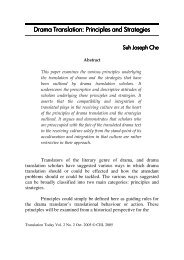Re-Evaluation of Lin Shu (the Chinese Translator) - National ...
Re-Evaluation of Lin Shu (the Chinese Translator) - National ...
Re-Evaluation of Lin Shu (the Chinese Translator) - National ...
Create successful ePaper yourself
Turn your PDF publications into a flip-book with our unique Google optimized e-Paper software.
150 <strong>Re</strong>-<strong>Evaluation</strong> <strong>of</strong> <strong>Lin</strong> <strong>Shu</strong> (<strong>the</strong> <strong>Chinese</strong> <strong>Translator</strong>):A Systemic Approach to Literary TranslationIntroduction:Despite much infidelity to <strong>the</strong> original, <strong>Lin</strong> <strong>Shu</strong>’s versions inclassical <strong>Chinese</strong> opened a window <strong>of</strong> foreign literature to <strong>Chinese</strong>and imported new ideas, literary concepts, styles and techniquesfrom <strong>the</strong> West. These, in turn, played a significant role in <strong>the</strong>development <strong>of</strong> <strong>Chinese</strong> society and <strong>the</strong> modernization <strong>of</strong> <strong>Chinese</strong>literature in particular. It’s <strong>Lin</strong> <strong>Shu</strong>’s translation like a grinder to <strong>the</strong>original that widened <strong>Chinese</strong> horizon and resulted in <strong>the</strong> turbulenttidewater <strong>of</strong> literary translation since <strong>the</strong> New Culture Movement(1915-1919). It can be said that <strong>Lin</strong> <strong>Shu</strong> initiated regular literarytranslation in China.Never<strong>the</strong>less, <strong>the</strong> criticism <strong>of</strong> <strong>Lin</strong> <strong>Shu</strong>’s translation hasusually been negative, highlighting its unfaithfulness to <strong>the</strong> original.Moreover, many a research has focused on <strong>the</strong> analysis <strong>of</strong> distortionin his translation to <strong>the</strong> source text and <strong>the</strong> discussion has restedupon whe<strong>the</strong>r he is worthy <strong>of</strong> <strong>the</strong> honor a “translator”. In this kind<strong>of</strong> research, <strong>the</strong> traditional notion <strong>of</strong> “faithfulness” is adopted as <strong>the</strong>criterion to evaluate <strong>Lin</strong> <strong>Shu</strong>’s translated works. So his translatedworks were <strong>of</strong>ten criticized. The concise classical language <strong>Lin</strong> <strong>Shu</strong>adopted to produce his versions is also one focus <strong>of</strong> <strong>the</strong> debate.All <strong>the</strong>se studies highlight linguistic and literary elements <strong>of</strong><strong>Lin</strong>’s translations. The dualistic division between a source languagetext (SLT) and its target language text (TLT) is employed in <strong>the</strong>process <strong>of</strong> research. Never<strong>the</strong>less, <strong>the</strong>se studies focusing on <strong>the</strong>faithfulness or equivalence can not elucidate <strong>the</strong> impact <strong>of</strong> <strong>Lin</strong> <strong>Shu</strong>’stranslated works on <strong>Chinese</strong> society at <strong>the</strong> turn <strong>of</strong> <strong>the</strong> twentiethcentury. Though with much infidelity, why did <strong>Lin</strong>’s translationsgreatly promote <strong>the</strong> development <strong>of</strong> early modern China and <strong>Chinese</strong>literature in particular? Why did <strong>Lin</strong> <strong>Shu</strong> distort <strong>the</strong> original somuch?
















